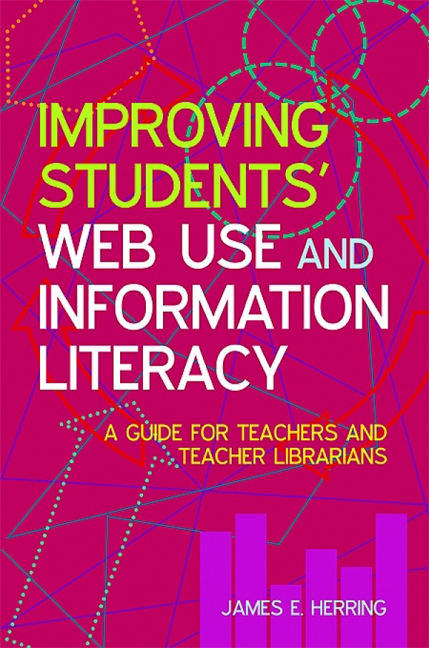Book contents
- Frontmatter
- Dedication
- Contents
- Acknowledgements
- Introduction
- 1 The big picture: learning and teaching in today's schools
- 2 Finding and using information on the web
- 3 Evaluating websites
- 4 Web 2.0 and schools
- 5 Information literacy
- 6 Improving student use of the web
- 7 Developing learning websites for student use - design and tools
- 8 Developing learning websites for student use - content
- 9 The next phase of ICT in schools
- Bibliography
- Index
2 - Finding and using information on the web
Published online by Cambridge University Press: 08 June 2018
- Frontmatter
- Dedication
- Contents
- Acknowledgements
- Introduction
- 1 The big picture: learning and teaching in today's schools
- 2 Finding and using information on the web
- 3 Evaluating websites
- 4 Web 2.0 and schools
- 5 Information literacy
- 6 Improving student use of the web
- 7 Developing learning websites for student use - design and tools
- 8 Developing learning websites for student use - content
- 9 The next phase of ICT in schools
- Bibliography
- Index
Summary
Introduction
The use of the web in today's schools by staff and students is now taken for granted and there is an assumption that all staff and students will be effective users of the web. Anecdotal evidence tends to suggest otherwise, however, and this author found when visiting several schools in different countries that many teachers and teacher librarians have limited abilities in searching effectively for information on the web. Staff in schools across the world often have very limited access to staff training that focuses on searching for information. Most staff are self-taught or have learned how to use search engines from colleagues whose experience may also be limited. It can be argued that there is a large opportunity cost for schools whose staff are not fully aware and fully equipped searchers of information on the web. Because there is so much free information on the web that can contribute to learning and teaching in schools, lack of expertise in searching can lead to many schools in effect losing out on finding out about concepts, ideas and experiences that could help staff improve their teaching and self development.
This chapter will seek to address the issues discussed above and provide a guide for increasing teachers’ and teacher librarians’ knowledge of search engines and directories, and improving their skills in searching for information on the web. It will also present an example of an in-service session on finding information on the web.
Search engines
The most common way to search for information in schools and society at large is by using a search engine, and by far the most popular search engine is Google. Notess defined a search engine as ‘an Internet-based search box that provides text-match searching of its own crawler-built database of textindexed Web pages [which provides access to] millions of freely accessible web pages’ (2006, 98). An important point to be remembered in Notess’ definition is that search engines provide text matching, which is different from keyword matching, and this is one reason why people are often disappointed by the ability of search engines to find relevant information about the keywords they have used.
- Type
- Chapter
- Information
- Improving Students' Web Use and Information LiteracyA Guide for Teachers and Teacher Librarians, pp. 15 - 34Publisher: FacetPrint publication year: 2010



